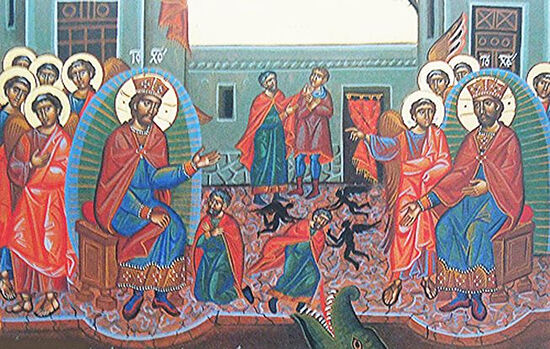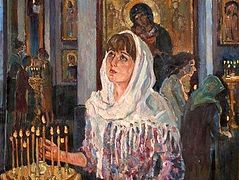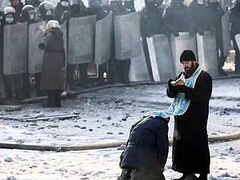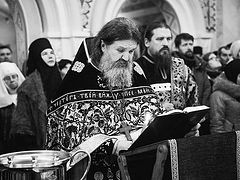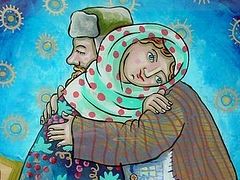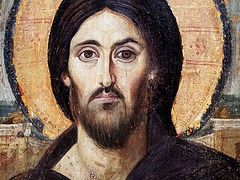1 Corinthians 9:2-12; Matthew 18:23-35
The Lord often taught in parables. A parable is a very short story that makes a particular point. Parables can spark our imagination and challenge us to see ourselves in a new light. Christ’s parables call us into question and get to the heart of the matter of where we stand before God. They help us to see the truth about ourselves more clearly.
The first servant in today’s parable begged for more time to pay an unbelievably large debt and his master responded with shocking mercy, for he forgave the debt completely. The servant then owed nothing at all. But instead of sharing the mercy that he had received with a fellow servant who owed him much less, the man refused to show any patience at all. He had the second servant put into prison until he could pay the debt. When word of his actions reached the master, he had the first servant put in jail until he could repay the entirety of the massive amount he had owed. Christ concludes the parable with these challenging words, “So also My heavenly Father will do to every one of you, if you do not forgive your brother from your heart.”
This parable shows that whether we forgive others reveals the health of our souls. The Lord’s mercy is transformative and participatory. If we have opened our hearts to receive His forgiveness, then His gracious divine energies must permeate our lives. He said, “love your enemies and pray for those who persecute you, that you may be children of your Father in heaven.” To become radiant with mercy to the point we do not limit our love only to our friends is necessary in order to “be perfect as your Heavenly Father is perfect.” (Matt. 5: 44-48)
If we call upon God’s forgiveness for our sins, we put ourselves in a false position whenever we refuse to forgive other people. He is infinitely holy and death is “the wages of sin” for us all. We are each the chief of sinners against the Father Who sent His Son for the salvation of the world. (Jn. 3:17) As those who dare to call for mercy beyond what we could possibly deserve, how may we refuse to forgive someone else? The God-Man enables us to become like Him in holiness, not to insist on our rights for satisfaction in relation to our neighbors. How we treat them, including those who have offended us, is how we treat our Lord. As St. John wrote, If anyone says, ‘I love God,’ but hates his brother, he is a liar. For anyone who does not love his brother, whom he has seen, cannot love God, whom he has not seen (1 Jn 4:20). When we refuse to forgive others, we demonstrate not only a lack of love for them, but for Christ.
As we all know, forgiveness often does not come quickly or easily. It is not simply a matter of what we say or how we act, but concerns our hearts. The Savior said that anger is at the root of murder and lust is at the root of adultery. He calls us to a purity of heart that frees us from bondage to such corrupt desires as we come to share more fully in His fulfillment of the human person in the divine image and likeness. In order to do so, we must turn our hearts away from indulging in holding grudges or obsessing about the wrongs of others, and instead learn to find our joy in the Lord. That is possible only as we open ourselves more fully to the healing power of the Holy Spirit in our lives. St. Paul wrote, “the fruit of the Spirit is love, joy, peace, forbearance, kindness, goodness, faithfulness, gentleness and self-control.” (Gal. 5:22-23) As St. Siluoan the Athonite taught, “One can only love one’s enemies through the grace of the Holy Spirit.” And “He who does not love his enemies, does not have God’s grace.”
How we respond to those who have wronged us reveals the true state of our souls in a way that goes beyond simplistic distortions of the Christian faith. In our world of corruption, the primal relationship between Adam and Eve remains broken and gives rise to resentment, domestic violence, and untold misery across the generations. Cain murdered his brother Abel, and people still kill family members, neighbors, and strangers for no reason other than jealousy and spite. We easily become blind to the image of God in every human person, especially those with whom we disagree or whom we think we should fear or hate for some reason. People build themselves up by putting others down, both individually and collectively, in ways too numerous to count. Our Lord was rejected as a blasphemer because the religious leaders of the time viewed Him as a threat to their power. The Romans crucified Him as an example of what would happen to anyone who dared to threaten their rule. Apart from the healing power of the Holy Spirit, there is no escape from slavery to an endless cycle of resentment and retribution that leads only to the grave.
The Savior endured the full consequences of such depravity in His crucifixion and death in order to provide a path that leads from the grave to the glory of the heavenly kingdom through His Resurrection on the third day. He abides in our hearts through the Holy Spirit through Whom we are able to cry out to God “Abba, Father,” for we are not slaves, but children of God, heirs to all the promises to Abraham through Christ. (Gal. 4:6) We will find the strength to offer the desires of our hearts to the Lord for healing by opening ourselves as fully as possible to the healing power of the Holy Spirit. He is “everywhere present and fills all things” and we have received the fullness of His presence in the holy mystery of Chrismation. In order to acquire the fruits of the Spirit, we must actively cooperate with God’s grace by growing in humility, which fundamentally requires learning to see ourselves as we truly are before God. That is what the first servant in today’s parable lacked, for he did not seem himself as simply a forgiven debtor who had received mercy he could never have deserved. If we will learn to see ourselves as truly the chief of sinners, as those whose entire existence and hope for fulfillment is dependent upon the mercy of the Lord, then we will no longer take joy in condemning others for their wrongs against us and in refusing to forgive others as we have been forgiven.
Growing in humility is the only way for us to find healing for our passions, for our disordered desires ultimately root in the pride of not accepting the truth about who we are before God. One powerful step for acquiring humility is to ask the forgiveness of those we have wronged, for doing so manifests the truth about who we are as people in need of mercy for the harm that we have we have done to our neighbors, who all bear the image of God. Serving others by putting their needs before our own is another path for becoming humble as we follow in the way of Christ, Who “did not come to be served, but to serve…” (Matt. 20:28) and Who washed the feet of His disciples. Fasting also provides an opportunity to deny ourselves in small ways and to support generosity to the needy with the resources saved by eating a humble diet. The fact that we are usually so bad at fasting can also destroy our illusions of righteousness pretty quickly.
As in all things, we must be mindful, keeping a close watch on our thoughts and desires as we refuse to welcome into our hearts anything that would hinder us from becoming living icons of the merciful healing of Christ. The challenge to forgive others as we have been forgiven is not a matter of religious legalism, but of finding the healing of our souls by the power of the Holy Spirit. If we acquire the humility to see ourselves as we truly are before the Lord, then we will not become like the first servant in today’s parable, but will instead become radiant with the gracious divine energies as we convey to others the same mercy that we have received through our Lord. That is the only way that we will ever be able to forgive others from the depths of our hearts.

